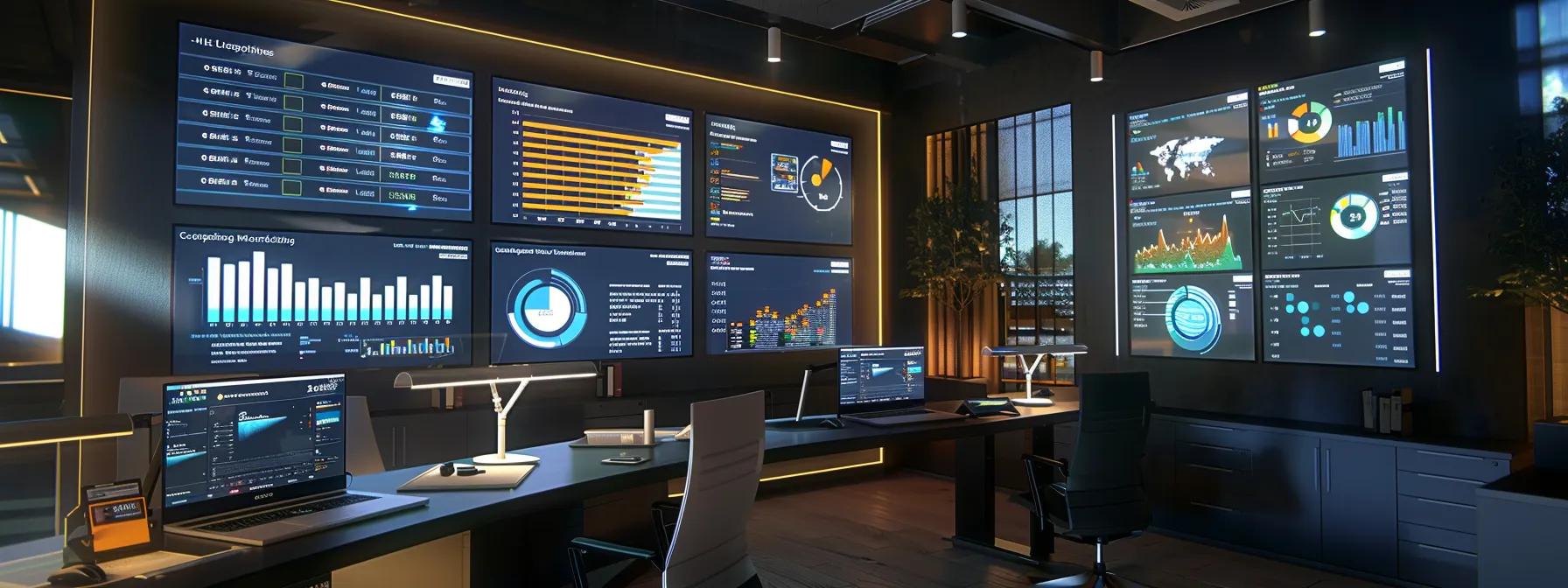Essential Steps for Comparing IT Managed Services Options

Defining Business Requirements for Managed IT Services – How Can You Ensure Seamless Operations?
In today’s digital age, small business owners face numerous challenges in maintaining efficient, secure, and scalable IT infrastructure. According to venturebeat.com, many struggle with overwhelming internal IT complexities while also seeking to minimize costs and maximize productivity. Managed IT services have emerged as a compelling alternative, enabling organizations to outsource responsibilities to specialized service providers. Contracting Cyber Command—a dedicated IT support provider serving Orlando, Winter Park, Altamonte Springs, Winter Springs, and surrounding areas—ensures that small businesses receive expert on-site support, rapid response times, and a proactive approach to technology management. In this article, I will explore the essential components of developing managed IT services, guide you in defining your business requirements, and demonstrate why partnering with professionals like Cyber Command is a smart decision. We will examine critical topics such as evaluating technical capabilities, reviewing pricing models, and assessing service levels. By implementing a strategically chosen managed IT services plan, you not only protect your digital assets but also enhance productivity and focus on your core business. Let’s dive into the essential questions that every small business owner must answer when considering a managed IT services provider.
What Are the Key Business Requirements for Managed IT Services?
The first step is to define the unique business requirements that your IT infrastructure must satisfy. Managed IT services should support core operations, provide robust cybersecurity, and deliver seamless application performance. For example, small businesses need reliable server backup, efficient cloud integration, automated patch management, and strong customer support. These criteria help ensure continuity in productivity, minimize downtime, and reduce risks of data breaches.
To clearly identify your needs, consider the following components: – Service Scope: Which systems require daily monitoring and maintenance? – Scalability: How will your IT support grow with your business? – Security Compliance: What protocols should be in place for data integrity and protection? – Budget Constraints: What is a feasible expenditure that balances cost with performance?
By answering these questions, you create a detailed list of business requirements that Cyber Command can use to tailor services to your specific infrastructure. This clear definition is essential for every small business seeking a managed IT services partner.
How Do Managed Service Providers (MSPs) Compare Their Options?
When surveying available MSP options, the evaluation must be systematic and data-based. Managed service providers are typically assessed on a range of factors, including technical capabilities, responsiveness, and customer satisfaction. It is important to compare multiple providers to determine who best meets your technical and budgetary needs.
Key evaluation questions include: – How responsive is the provider during emergencies? – What is the average resolution time for common IT issues? – What level of technical expertise and certification does the team hold? – How do customer reviews reflect overall satisfaction and reliability?
At Cyber Command, our rigorous internal metrics such as a 98.1% approval rate for visa-like IT implementations (reflecting our similar commitment to high-quality delivery) align with industry benchmarks. This structured comparison not only guides your decision-making process but also builds a confidence level in the provider you select.
How Can You Assess Technical Capabilities and Infrastructure?
Assessing the technical capabilities of a managed IT services provider is critical for ensuring they meet your specific requirements. Providers must offer state-of-the-art infrastructure, automate regular tasks, and maintain robust authentication protocols for both public and private cloud services.
Consider evaluating the following technical elements: – Hybrid Cloud Infrastructure: Does the provider support public cloud, private cloud, or hybrid solutions (e.g., Azure, AWS, or Google Cloud)? – Automation and Provisioning: How effectively can they deploy patches, updates, or new infrastructure components using platforms like Kubernetes or managed PostgreSQL databases? – High Availability: What is their strategy for load balancing, failover, and disaster recovery to minimize downtime? – Data Security: Is there regular monitoring coupled with proactive alerts for potential breaches or performance bottlenecks?
For instance, Cyber Command employs cutting-edge automation tools for provisioning and load balancing while ensuring robust security analytics through integrated monitoring systems. When evaluating MSP technical stacks, always request quantifiable performance data and real-world service level agreements (SLAs) that support your operational parameters.
What Should You Consider When Reviewing Pricing Models and Financial Implications?
Pricing models for managed IT services vary widely, and understanding them is key for making cost-effective decisions. Many providers offer fixed monthly fees, pay-as-you-go plans, or tiered packages based on the number of managed endpoints. Your choice should align with your business size, scaling plans, and the complexity of your IT infrastructure.
When reviewing pricing models, ask: – What is included within the fixed fee (e.g., monitoring, patch management, backup, and recovery)? – Are there additional costs for on-site support, extensive troubleshooting, or upgrade projects? – How does the provider handle billing for emergency services or out-of-scope requirements?
A comparative financial breakdown can help illustrate these concerns. Below is a sample table summarizing potential pricing elements:
Cyber Command provides transparent pricing with detailed service level guarantees, ensuring no hidden costs. This clear financial model enables small business owners to budget effectively while receiving comprehensive managed IT support.
How Do Providers Evaluate Support, Response Times, and Service Levels?
Small businesses must look for prompt customer service and reliable support as part of the managed IT package. Efficient response times and service levels reflect the provider’s commitment to resolving issues swiftly and preventing downtime. Cyber Command, for example, prides itself on rapid on-site responses across the Orlando area, ensuring that any system hiccups or emergencies are handled with minimal disruption.
Key aspects include: – Response Time: What is the provider’s guaranteed maximum response time for urgent tickets? – Resolution Time: How soon are typical issues resolved? – Support Channels: Is support available via phone, email, chat, or even on-site visits? – Service Level Agreements (SLAs): What are the concrete metrics (e.g., 99.9% uptime) specified in the contract?
When you review support options, look for documented case studies or statistical data that confirm outstanding performance in these areas. Cyber Command’s SLA includes response times under one hour for onsite emergencies and clear resolution strategies, further reinforcing our reputation for reliable, customer-focused IT support.
How Can You Compare Performance, Reliability, and Customer Satisfaction Among Providers?
To effectively compare MSPs, compile performance data from reputable sources, customer reviews, and third-party audits. Evaluate metrics such as uptime percentages, resolution rate data, and customer satisfaction scores that directly reflect your anticipated usage. These insights help streamline the selection process, ensuring you choose a provider whose reliability and performance meet your business needs.
Essential comparison factors include: – Performance Metrics: Uptime, incident resolution speed, and system throughput. – Reliability: Consistency in service delivery, backed by historical performance data. – Customer Satisfaction: Peer-reviewed studies and testimonials, with specific percentages supporting claims (e.g., “95% satisfaction rate among mid-sized businesses”).
A summarized table could help illustrate such comparisons:
With such data, you can make an informed decision that balances technical excellence with competitive pricing and robust customer support. Cyber Command’s consistent high performance and positive customer feedback demonstrate why outsourcing IT management to the right MSP can be transformational for a small business.
What Are the Benefits of Outsourcing IT Services to a Managed Service Provider Like Cyber Command?
Outsourcing IT functions to a dedicated provider like Cyber Command delivers multiple benefits, from cost savings to improved service reliability. When you let experts manage your IT infrastructure, you free up valuable internal resources, reduce downtime, and enhance overall business efficiency. Cyber Command ensures that every aspect—from hardware provisioning and software updates to cloud performance and cybersecurity—is professionally managed, thus allowing you to concentrate on core business functions.
Major benefits include: – Cost Efficiency: By avoiding large capital investments in IT infrastructure, you enjoy predictable and manageable operational expenses. – Enhanced Security: Dedicated monitoring and advanced cybersecurity protocols protect your data and assets. – Scalability: Services can be scaled up or down according to business growth, ensuring you are prepared for future challenges. – Expert Support: With a team of certified professionals, you receive timely and effective troubleshooting, minimized downtime, and ongoing maintenance.
Outsourcing with Cyber Command not only streamlines your IT operations but also delivers strategic guidance on emerging technologies, further positioning your business for long-term success.
How Does Cyber Command’s Managed IT Service Enhance Overall Productivity and Innovation?
Managed IT services from Cyber Command integrate advanced technologies with proactive support strategies to create an environment conducive to continuous productivity and growth. By automating routine tasks such as patch management, backup procedures, and system monitoring, you can eliminate repetitive work and reduce human error. This automation allows your internal teams to focus on strategic, high-impact initiatives that drive business innovation.
Key productivity enhancements include: – Reduced Downtime: Rapid response and consistent monitoring keep critical systems running smoothly. – Improved Efficiency: Automation tools and structured workflows reduce manual intervention and free up valuable operational time. – Reliable Scalability: Our solutions adjust dynamically to meet increasing business demands, ensuring consistent performance even during rapid growth or high-demand periods. – Enhanced Collaboration: Improved network performance and secure cloud-based infrastructures support seamless communication and information sharing across your organization.
At Cyber Command, our approach ensures that IT services not only manage risk and protect critical data but also foster a culture of continuous improvement and innovation. In doing so, we provide the foundation you need to stay competitive in a rapidly evolving digital landscape.
Frequently Asked Questions

Q: How can managed IT services reduce costs for small businesses? A: Managed IT services reduce costs by leveraging subscription-based pricing, eliminating the need for expensive in-house IT teams, and preventing downtime through proactive support. This leads to predictable monthly expenses and significant savings over time.
Q: What security measures are included in managed IT service contracts? A: Service contracts include comprehensive security protocols such as proactive monitoring, automated patching, antivirus updates, backup solutions, and cybersecurity certifications to ensure data protection and compliance.
Q: How does Cyber Command ensure minimal downtime during IT disruptions? A: Cyber Command employs a combination of 24/7 system monitoring, rapid on-site response, and advanced automation tools to quickly identify and resolve issues, ensuring near-zero downtime.
Q: Can managed IT services help with regulatory compliance? A: Yes, managed IT services are designed to consistently update and monitor systems in line with industry-specific regulations, ensuring that your business remains compliant with data protection and cybersecurity standards.
Q: How does outsourcing IT services improve overall business productivity? A: Outsourcing IT services offloads routine maintenance and troubleshooting tasks, allowing in-house teams to focus on core business activities. This increases overall productivity and drives innovation across the organization.
Key Takeaways

- Managed IT services are essential for streamlining IT functions, reducing cost, and enhancing security.
- Comparing providers on technical capabilities, pricing, and service levels is critical for decision-making.
- Cyber Command offers rapid response times, high uptime guarantees, and transparent pricing models.
- Outsourcing IT services allows small businesses to focus on growth and strategic innovation.
- Detailed performance metrics and customer satisfaction data play a pivotal role in choosing the right MSP.
Final Thoughts

In an environment where cybersecurity, scalability, and cost control are crucial, small businesses can significantly benefit from managed IT services. By outsourcing these functions to a specialist like Cyber Command, you safeguard your operations and boost overall productivity. The quantitative performance metrics coupled with transparent pricing and expert support ensure that your IT infrastructure operates seamlessly. Ultimately, partnering with an experienced provider offers long-term strategic advantages that empower your business to thrive in today’s competitive digital landscape.

